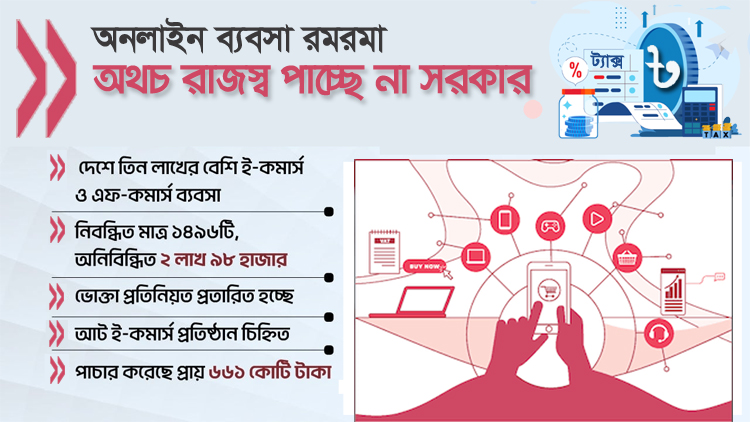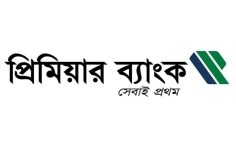Massive Black Hole in Bangladesh’s E-Commerce: Over 2.98 Lakh Unregistered Businesses Operating Illegally

Bangladesh’s digital marketplace is thriving on the surface—but beneath the glitter lies a ticking economic time bomb. According to intelligence findings, more than 300,000 e-commerce and f-commerce businesses are currently operating across the country. Shockingly, only 1,496 of them are registered under the Digital Business Identification System (DBID). That leaves a staggering 298,000 platforms operating without oversight, transacting over Tk 50,000 crore—entirely outside the government’s tax net.
These unregistered platforms not only deprive the state of crucial revenue, but also operate unchecked, duping customers with ease. Many use mobile financial services (MFS) illegally to collect payments, making mobile banking apps unwilling accomplices in this unregulated digital jungle.
A recent Special Branch (SB) report from Bangladesh Police, submitted to the National Board of Revenue (NBR), has laid bare the scale of the crisis. Along with revenue loss, the report highlights disturbing patterns of money laundering and digital fraud orchestrated by multiple e-commerce players.
Investigations by the Criminal Investigation Department (CID) have revealed that eight companies laundered over Tk 661 crore through their platforms. These include:
Anander Bazar – Tk 300 crore
E-Orange – Tk 232 crore
Dhamaka – Tk 116 crore
Ring ID – Tk 37.49 crore
Twenty-Four Ticket Ltd. – Tk 4.44 crore
SPC World – Tk 1.17 crore
Sirajganj Shop – Tk 4.09 crore
Akashnil.com – Tk 3 croreAll eight companies now face legal action. Yet, these cases may represent only a small fraction of the overall fraud taking place.
Victims of digital fraud have reported numerous schemes—ranging from fake websites that disappear post-payment, to delivery scams involving counterfeit or no products at all. There are also widespread uses of manipulated influencer marketing, fake customer reviews, inflated page engagements, and false identities to build trust and lure in unsuspecting buyers. Many of these businesses also use SIM cards registered under fake or third-party names, making law enforcement’s job even harder.
The SB report estimates that out of Bangladesh’s 10 crore Facebook users, at least 1 crore are engaged in buying or selling online. Around 3.5 lakh Facebook and Instagram pages are actively conducting business—95% of them belonging to small entrepreneurs. However, most of these pages lack any visible trade license, DBID, or VAT registration, leaving consumers vulnerable and fraudsters unaccountable.
According to the e-Commerce Association of Bangladesh (e-CAB), around 6 to 7 lakh deliveries are made daily, with an average transaction size of Tk 1,400. Astonishingly, about 25% of this entire market is driven by Facebook-based businesses—most of which are unregistered.
Bangladesh Bank data shows that in 2020, the total legal e-commerce transaction volume stood at Tk 5,142 crore. This rose to Tk 21,112 crore by 2024. However, factoring in unregulated transactions reveals a much larger number: over Tk 50,000 crore. This exposes a gaping hole in oversight, enforcement, and economic policy.
Although the Digital Commerce Management Guidelines, 2021 mandate trade licenses, VAT registration, e-TIN, or DBID—and require businesses to visibly display them—compliance remains alarmingly low. As a result, fake and fraudulent businesses are thriving.
A senior official at NBR, speaking to Daily Industry, said, “We notice a spike in digital fraud during major festivals like Eid-ul-Fitr, Eid-ul-Adha, and Pahela Baishakh. Scammers are constantly inventing new methods. We are reviewing the Special Branch’s report carefully and will take appropriate steps.”
The report reveals that some dishonest employees at telecom companies and SIM vendors are supplying SIM cards registered under fake or alternative names. This practice is helping fraudsters stay anonymous. As a result, analyzing call detail records (CDRs) and identifying the real culprits becomes nearly impossible for law enforcement.
Seven Key Recommendations from the SB Report
Identify all unregistered e-commerce and f-commerce platforms and enforce mandatory DBID registration
Enact a comprehensive digital commerce law to regulate the sector
Make DBID registration mandatory for access to any digital marketplace
Introduce escrow payment systems to protect both buyers and sellers
Lower transaction charges for registered businesses using MFS services
Crack down on the illegal use of SIM cards and mobile banking for fraudBangladesh stands at a digital crossroads—between innovation and exploitation. With the e-commerce market expected to reach Tk 1.5 trillion by 2026, the stakes are sky-high. The time to act is now. Without swift policy enforcement, rigorous registration, and proper monitoring, the country risks hemorrhaging both its public trust and billions in potential revenue.







